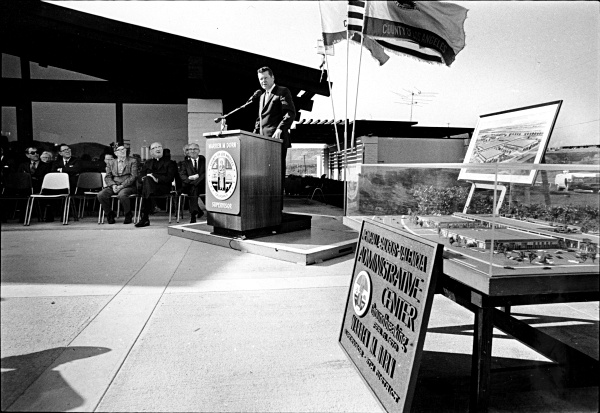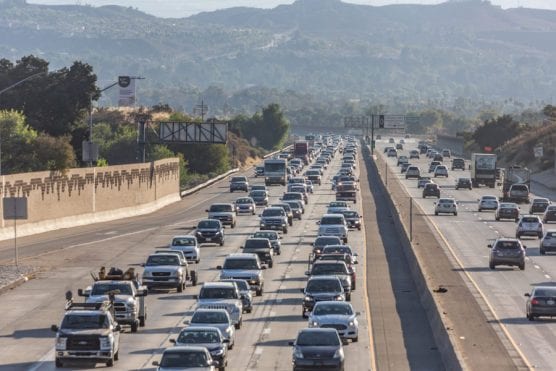Santa Clarita City Council voted unanimously Tuesday to voice opposition to a Metro study looking into the implementation of a freeway toll program.
Los Angeles Metropolitan Authority officials said the goal of their study was to find a traffic-reduction program feasible before the 2028 Olympics, and to use those funds to create additional transit options, new roads and higher-capacity freeways.
“Metro’s Traffic Reduction Study is not proposing any toll road plan through Santa Clarita,” Dave Sotero, a spokesman for Metro, said Friday. “We are conducting a feasibility study first to understand the potential for congestion pricing and additional transportation options to address traffic and provide people with more high-quality ways to get around.”
The four possible concepts include reducing traffic through the use of tolls in downtown L.A., between the L.A. Basin and the San Fernando Valley, and/or along the Interstate 10 corridor between Santa Monica and Downtown L.A., according to Metro’s website.
Direct, indirect effects
And while acknowledging Metro’s study is looking at possible toll roads that do not run through the SCV, the City Council members on Tuesday did take issue and highlight that the roads that are mentioned in the report are used by some SCV residents commuting to the city of Los Angeles.
“This absolutely will affect our residents if they need to travel to get to their jobs on these tolls roads. It affects everyone regionally,” Councilwoman Marsha McLean said Friday. “If it doesn’t affect an area directly, it will affect an area indirectly.”
A presentation made by city staff during Tuesday’s meeting showed that Metro’s study for the congestion pricing began in 2020, and the first of the pilot programs — following a few years of development and approval processes — could begin as early as 2025.
While the implementation of the programs has not yet been undertaken, the public participants in the City Council meeting and the members of the council used the opportunity to voice strong opposition to the creation of “congestion pricing” on L.A. County freeways.
“Make no mistake, there’s a really simple way to discuss this: It’s called toll roads,” said Alan Ferdman, a Santa Clarita resident who spoke during the meeting. “And that’s going to generate a huge amount of money that they are going to squander.”
McLean also made her displeasure at the idea of the toll roads known during the meeting, saying that Metro changed the name of the potential toll road project — from “congestion pricing” to “traffic reduction study” — after receiving strong opposition to the plan in years past.
“Make no mistake, their decision is made,” said McLean, later adding, “Unless we create a lot of noise about this and attend these Zoom meetings … (and) tell them we’re not going to be fooled, we’re not going to accept this, we’re going to wind up with it,” McLean added.
Equitable impact
Councilman Cameron Smyth called the toll road plan a form of regressive taxation, adding its people with lower-to-moderate incomes who have the longest commutes.
Metro officials noted their pilot programs, should they be implemented, would explore how they could promote equity for vulnerable communities.
“Each of the concepts that are explored in the Traffic Reduction Study will be analyzed for their potential benefits and burdens on low-income households and communities,” said Sotero. “Once these have been identified, Metro will work to develop a suite of transportation improvements and low-income assistance programs to increase the benefits and address the burdens.”
The City Council drew exception to Metro highlighting in the study the use of toll roads in European cities such as London and Stockholm. Council members said they did not agree with Metro’s comparison between Southern California and these European cities, saying that the infrastructure and public transportation systems of these cities allow for people to have alternatives to driving, unlike the SoCal region.
At the conclusion of the discussion, the council directed city staff to express their position of opposition to Metro’s current proposal for a toll road program.
The project’s current schedule has the Metro board deciding this summer which concept to continue studying and developing. Upon completion of the study, which is anticipated in spring 2022, the Metro board of directors will decide whether to implement a traffic reduction pilot program in partnership with one or more cities.
Metro has said it is committed to engaging stakeholders and the public throughout the study, and will be hosting its next community Zoom meetings on Feb. 16 and Feb. 27. Directions on how to view and/or participate in the meetings can be found at https://thesource.metro.net/2021/02/09/traffic-reduction-study-hosts-virtual-meetings-to-learn-more-about-early-concepts/.
Like this:
Like Loading...
Related





 Tweet This
Tweet This Facebook
Facebook Digg This
Digg This Bookmark
Bookmark Stumble
Stumble RSS
RSS
























REAL NAMES ONLY: All posters must use their real individual or business name. This applies equally to Twitter account holders who use a nickname.
0 Comments
You can be the first one to leave a comment.